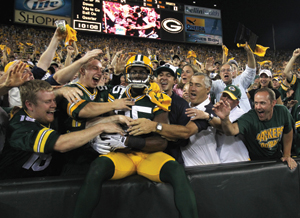Perhaps the most notable aspect of the Green Bay Packers’ record-shattering earnings and revenue reported last week is where the money will not go: to the team’s nearly 10-year-old rainy day fund, which had consumed previous years’ profits.
In Green Bay, with a new, owner-friendly collective-bargaining agreement now entering the second of 10 years; a Super Bowl-caliber team on the field; little debt; and arguably the league’s most rabid fan base, there is not much rain on the horizon. The $43 million profit instead will fund the continuing renovation of Lambeau Field, both its field-level bowl and the interior network of restaurants and retail stores.
 |
The team’s revemue took a Lambeau leap to $302 million for the 2012 fiscal year.
Photo by: GETTY IMAGES
|
After years of declining profit margins, a key concern of the NFL in the years leading to last summer’s lockout, the Packers now are returning more than 10 percent on their more than $300 million in revenue.
“We have the first evidence that the NFL has turned the corner,” said Marc Ganis, a sports business consultant with deep ties to NFL management. In the decade before the new CBA, there was a steady decline in team profit margins across the league, according to Ganis, who said he recently reviewed financial records from that period.
The new CBA lowered the percentage of revenue that players receive.
Now, the Packers’ profit margin has soared, from around 3 percent to almost 10 percent. Team expenses fell $11.5 million last year, to $259 million, while total revenue jumped $19.4 million, to $302 million.
Green Bay Packers financials ($ millions)
| Category | 2012* | 2011* |
| Total revenue | $302.0 | $282.6 |
| • Local revenue | $130.4 | $119.3 |
| • National revenue | $171.6 | $163.3 |
| Expenses | $259.0 | $270.5 |
| Net income | $42.7 | $17.1 |
| Net profit from operations | $27.9 | $7.8 |
| Player costs^ | $155.4 | $158.9 |
* Years ended March 31
^ Includes salaries, benefits, workers’ compensation payouts, payroll taxes and player travel costs
Source: Green Bay Packers
Andrew Brandt was a key Packers executive when the team set its last profit record ($34.2 million) in 2007. All that cash went to the Preservation Fund, established in 2004 after Peyton Manning’s $34 million signing bonus in Indianapolis scared the Packers — who at the time had Brett Favre as their quarterback — into contemplating a league without a salary cap.
Brandt said he didn’t see profit numbers like this year’s mark in his nine years with the club. “It is salad days now,” he said.
Extrapolating the Packers’ success across the league’s 31 other teams is problematic, even though the club’s financials, the only public ones in the NFL, were often used as a PR piñata during the labor battle.
The only figure that is transferable is the team’s national revenue total, which represents the amount the Packers get of the evenly distributed league money. In the year ended March 31, 2012, the team received $171.6 million, up from $163.3 million. That would mean league national revenue, fueled by TV, NFL Ventures and sponsorship monies, rose $8.3 million per club, or $265 million total, a fairly modest jump by NFL standards.
Total league revenue in 2011 was around $9.4 billion.
The Packers’ local revenue jumped more than $11 million, driven in large part by sales at the team’s pro shop, reflecting the club’s Super Bowl win the prior year.
But across the league, team insiders have reported soft local revenue, part of the reason the salary cap will not rise much in year two of the CBA. If the Packers were the norm, the cap would have risen many millions of dollars per club, but most teams have kept the line on ticket prices, or have lowered them, in an effort to fill stadiums.




